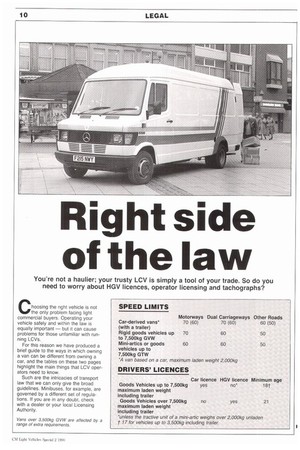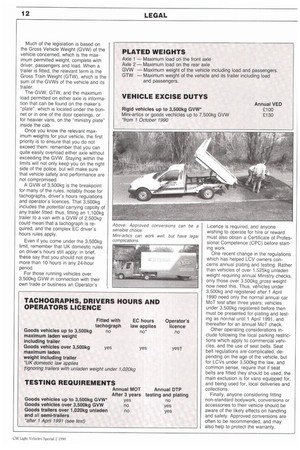Right side of the law
Page 94

Page 96

If you've noticed an error in this article please click here to report it so we can fix it.
You're not a haulier; your trusty LCV is simply a tool of your trade. So do you need to worry about HGV licences, operator licensing and tachographs?
Choosing the right vehicle is not the only problem facing light commercial buyers. Operating your vehicle safely and within the law is equally important — but it can cause problems for those unfamiliar with running LCVs._
For this reason we have produced a brief guide to the ways in which owning a van can be different from owning a car, and the tables on these two pages highlight the main things that LCV operators need to know.
Such are the intricacies of transport law that we can only give the broad guidelines. Minibuses. for example, are governed by a different set of regulations. If you are in any doubt, check with a dealer or your local Licensing Authority. Much of the legislation is based on the Gross Vehicle Weight (GVW) of the vehicle concerned, which is the maximum permitted weight, complete with driver, passengers and load. When a trailer is fitted, the relevant term is the Gross Train Weight (GTW), which is the sum of the GVWs of the vehicle and its trailer.
The GVW, GTW, and the maximum load permitted on either axle is information that can be found on the maker's "plate", which is located under the bonnet or in one of the door openings, or for heavier vans, on the "ministry plate" inside the cab.
Once you know the relevant maximum weights for your vehicle, the first priority is to ensure that you do not exceed them: remember that you can quite easily overload either axle without exceeding the GVW. Staying within the limits will not only keep you on the right side of the police, but will make sure that vehicle safety and performance are not compromised.
A GVW of 3,500kg is the breakpoint for many of the rules, notably those for tachographs, driver's hours regulations and operator's licences. That 3,500kg includes the potential carrying capcity of any trailer fitted: thus, fitting an 1,100kg trailer to a van with a GVW of 2,500kg could mean that a tachograph is required, and the complex EC driver's hours rules apply.
Even if you come under the 3,500kg limit, remember that UK domestic rules on driver's hours still apply: in brief, these say that you should not drive more than 10 hours in any 24-hour period.
For those running vehicles over 3,500kg GVW in connection with their own trade or business an Operator's Licence is required, and anyone wishing to operate for hire or reward must also obtain a Certificate of Professional Competence (CPC) before starting work.
One recent change in the regulations which has helped LCV owners concerns annual plating and testing. Rather than vehicles of over 1,525kg unladen weight requiring annual Ministry checks, only those over 3,500kg gross weight now need this. Thus, vehicles under 3,500kg and registered after 1 April 1990 need only the normal annual car MoT test after three years; vehicles under 3,500kg registered before then must be presented for plating and testing as normal until 1 April 1991, and thereafter for an annual MoT check.
Other operating considerations include following the local parking restrictions which apply to commercial vehicles, and the use of seat belts. Seat belt regulations are complicated, depending on the age of the vehicle, but for LCVs under 3,500kg the law, and common sense, require that if seat belts are fitted they should be used; the main exclusion is for vans equipped for, and being used for, local deliveries and collections.
Finally, anyone considering fitting non-standard bodywork, conversions or accessories to their vehicle should be aware of the likely effects on handling and safety. Approved conversions are often to be recommended, and may also help to protect the warranty.
















































































































